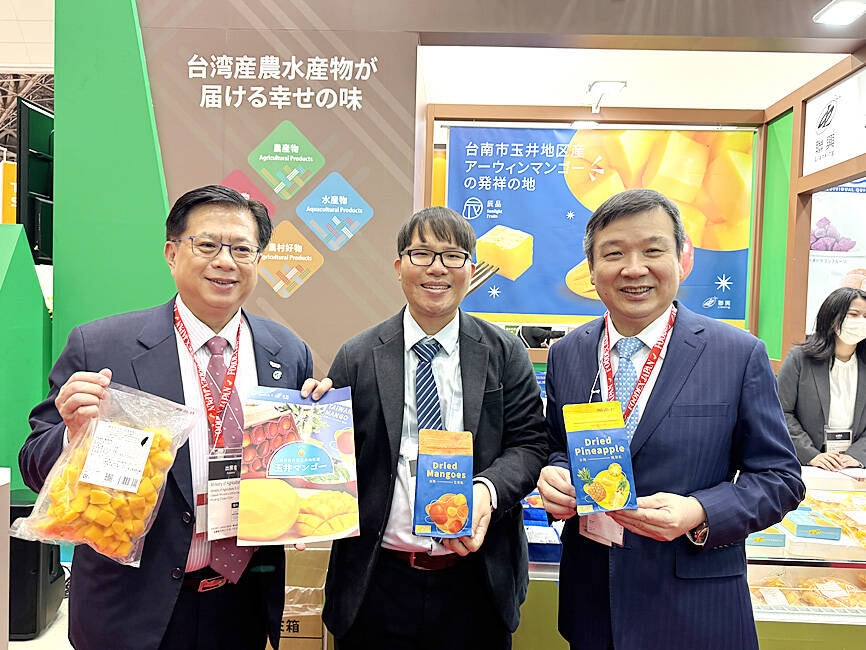Japan was one of the top three destinations for Taiwanese agricultural exports for the past three years, the Ministry of Agriculture said yesterday at the opening of Foodex Japan, Asia’s largest food trade show.
Ministry data showed that key exports to Japan from 2022 to last year included frozen tuna, orchids and other live flowers, as well as feathers and down.
Frozen tuna shipments to Japan consistently accounted for more than half of Taiwan’s annual tuna exports during that period, while orchids and live flowers made up 14 to 18.4 percent, and feathers and down ranged from 5.6 to 17.7 percent, the ministry said.

Photo: CNA
Conversely, Taiwan’s top agricultural imports from Japan over the past three years included fresh chilled beef, which accounted for 9.4 to 13.1 percent of the nation’s total beef imports.
In addition, Japanese alcoholic beverages ranked among Taiwan’s top imports in 2022, accounting for 9.5 percent of total imports in that category, the ministry said.
Last year, fresh chilled apples ranked ninth among Taiwan’s agricultural imports, with Japan accounting for 23.9 percent of total apple imports, after the US and New Zealand.
Taiwan’s agricultural exports to Japan totaled US$856 million in 2022, representing 16.3 percent of overall agricultural exports and marking an 11 percent annual increase.
However, in 2023, exports declined 16 percent to US$719 million, accounting for 14.7 percent of total exports.
Last year, Japan ranked as Taiwan’s third-largest agricultural export market, with exports falling 10 percent to US$648 million, behind the US with US$887 million, or 18 percent, and China, with US$747 million, or 15.2 percent, ministry data showed.
The ministry attributed the decline to global inflation, rising interest rates and the depreciation of the yen, adding that higher global grain prices also constrained Japan’s overall import capacity.

BYPASSING CHINA TARIFFS: In the first five months of this year, Foxconn sent US$4.4bn of iPhones to the US from India, compared with US$3.7bn in the whole of last year Nearly all the iPhones exported by Foxconn Technology Group (富士康科技集團) from India went to the US between March and last month, customs data showed, far above last year’s average of 50 percent and a clear sign of Apple Inc’s efforts to bypass high US tariffs imposed on China. The numbers, being reported by Reuters for the first time, show that Apple has realigned its India exports to almost exclusively serve the US market, when previously the devices were more widely distributed to nations including the Netherlands and the Czech Republic. During March to last month, Foxconn, known as Hon Hai Precision Industry

Taiwan Semiconductor Manufacturing Co (TSMC, 台積電) and the University of Tokyo (UTokyo) yesterday announced the launch of the TSMC-UTokyo Lab to promote advanced semiconductor research, education and talent development. The lab is TSMC’s first laboratory collaboration with a university outside Taiwan, the company said in a statement. The lab would leverage “the extensive knowledge, experience, and creativity” of both institutions, the company said. It is located in the Asano Section of UTokyo’s Hongo, Tokyo, campus and would be managed by UTokyo faculty, guided by directors from UTokyo and TSMC, the company said. TSMC began working with UTokyo in 2019, resulting in 21 research projects,

Ashton Hall’s morning routine involves dunking his head in iced Saratoga Spring Water. For the company that sells the bottled water — Hall’s brand of choice for drinking, brushing his teeth and submerging himself — that is fantastic news. “We’re so thankful to this incredible fitness influencer called Ashton Hall,” Saratoga owner Primo Brands Corp’s CEO Robbert Rietbroek said on an earnings call after Hall’s morning routine video went viral. “He really helped put our brand on the map.” Primo Brands, which was not affiliated with Hall when he made his video, is among the increasing number of companies benefiting from influencer

Quanta Computer Inc (廣達) chairman Barry Lam (林百里) yesterday expressed a downbeat view about the prospects of humanoid robots, given high manufacturing costs and a lack of target customers. Despite rising demand and high expectations for humanoid robots, high research-and-development costs and uncertain profitability remain major concerns, Lam told reporters following the company’s annual shareholders’ meeting in Taoyuan. “Since it seems a bit unworthy to use such high-cost robots to do household chores, I believe robots designed for specific purposes would be more valuable and present a better business opportunity,” Lam said Instead of investing in humanoid robots, Quanta has opted to invest